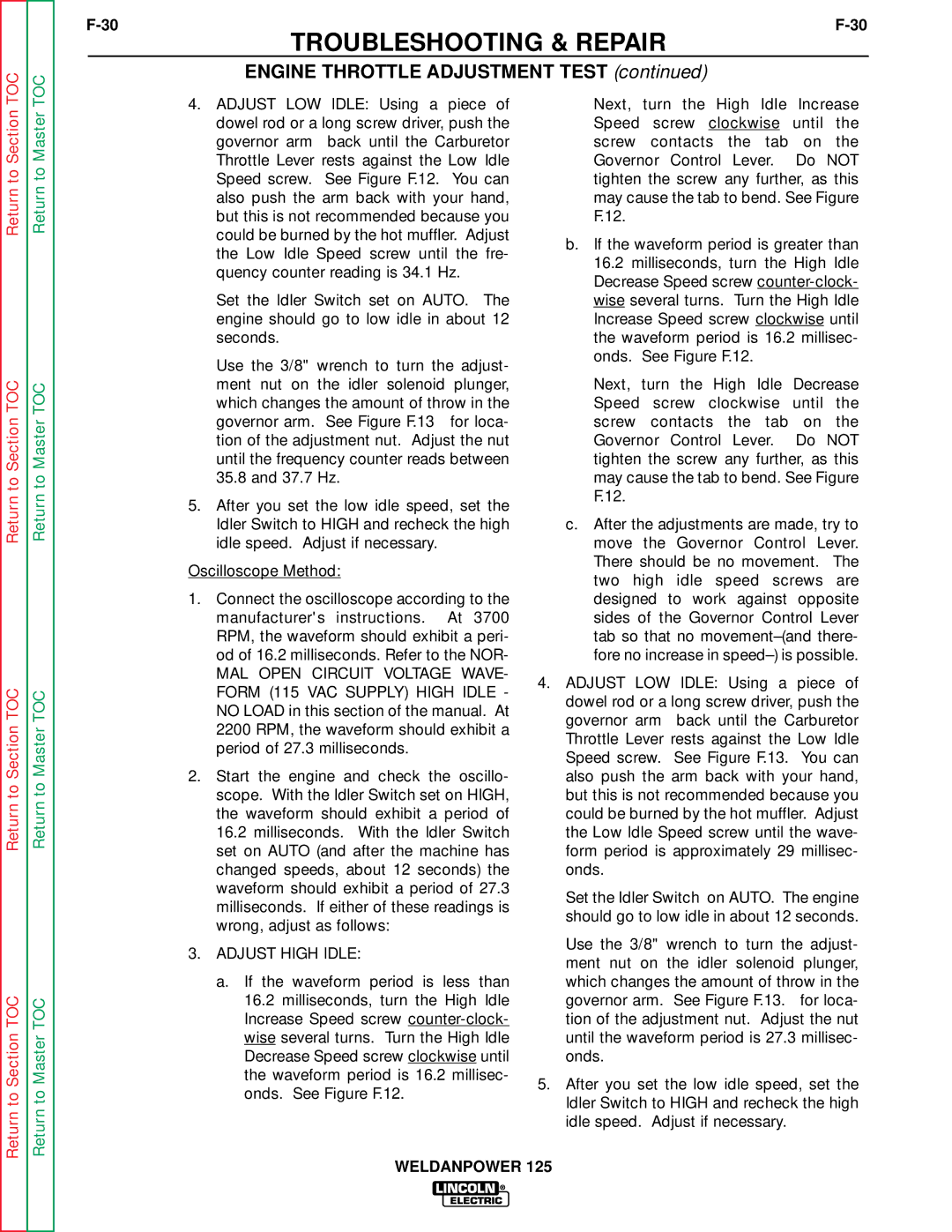
Return to Section
Return to Section TOC
Return to Section TOC
Return to Section TOC
Return to Master
Return to Master TOC
Return to Master TOC
Return to Master TOC
4.ADJUST LOW IDLE: Using a piece of dowel rod or a long screw driver, push the governor arm back until the Carburetor Throttle Lever rests against the Low Idle Speed screw. See Figure F.12. You can also push the arm back with your hand, but this is not recommended because you could be burned by the hot muffler. Adjust the Low Idle Speed screw until the fre- quency counter reading is 34.1 Hz.
Set the Idler Switch set on AUTO. The engine should go to low idle in about 12 seconds.
Use the 3/8" wrench to turn the adjust- ment nut on the idler solenoid plunger, which changes the amount of throw in the governor arm. See Figure F.13 for loca- tion of the adjustment nut. Adjust the nut until the frequency counter reads between
35.8 and 37.7 Hz.
5.After you set the low idle speed, set the Idler Switch to HIGH and recheck the high idle speed. Adjust if necessary.
Oscilloscope Method:
1.Connect the oscilloscope according to the manufacturer's instructions. At 3700 RPM, the waveform should exhibit a peri- od of 16.2 milliseconds. Refer to the NOR-
MAL OPEN CIRCUIT VOLTAGE WAVE- FORM (115 VAC SUPPLY) HIGH IDLE - NO LOAD in this section of the manual. At 2200 RPM, the waveform should exhibit a period of 27.3 milliseconds.
2.Start the engine and check the oscillo- scope. With the Idler Switch set on HIGH, the waveform should exhibit a period of 16.2 milliseconds. With the Idler Switch set on AUTO (and after the machine has changed speeds, about 12 seconds) the waveform should exhibit a period of 27.3 milliseconds. If either of these readings is wrong, adjust as follows:
3.ADJUST HIGH IDLE:
a.If the waveform period is less than 16.2 milliseconds, turn the High Idle Increase Speed screw
Next, turn the High Idle Increase Speed screw clockwise until the screw contacts the tab on the Governor Control Lever. Do NOT tighten the screw any further, as this may cause the tab to bend. See Figure F.12.
b.If the waveform period is greater than 16.2 milliseconds, turn the High Idle Decrease Speed screw
Next, turn the High Idle Decrease Speed screw clockwise until the screw contacts the tab on the Governor Control Lever. Do NOT tighten the screw any further, as this may cause the tab to bend. See Figure F.12.
c.After the adjustments are made, try to move the Governor Control Lever. There should be no movement. The two high idle speed screws are designed to work against opposite sides of the Governor Control Lever tab so that no
4.ADJUST LOW IDLE: Using a piece of dowel rod or a long screw driver, push the governor arm back until the Carburetor Throttle Lever rests against the Low Idle Speed screw. See Figure F.13. You can also push the arm back with your hand, but this is not recommended because you could be burned by the hot muffler. Adjust the Low Idle Speed screw until the wave- form period is approximately 29 millisec- onds.
Set the Idler Switch on AUTO. The engine should go to low idle in about 12 seconds.
Use the 3/8" wrench to turn the adjust- ment nut on the idler solenoid plunger, which changes the amount of throw in the governor arm. See Figure F.13. for loca- tion of the adjustment nut. Adjust the nut until the waveform period is 27.3 millisec- onds.
5.After you set the low idle speed, set the Idler Switch to HIGH and recheck the high idle speed. Adjust if necessary.
WELDANPOWER 125
